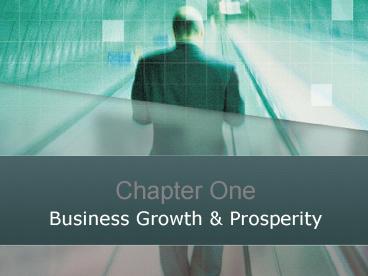Chapter One PowerPoint PPT Presentation
1 / 17
Title: Chapter One
1
Chapter One
- Business Growth Prosperity
2
Entrepreneurship
- Entrepreneur Someone who starts, manages, and
owns a business - Most entrepreneurships start as small businesses
- Small Business The term applied to any business
that is operated by a one or a few individuals
3
Why Do People Become Entrepreneurs?
- To leave the fast paced corporate environment
- To be at home but still earn an income
- To pursue a personal dream
4
What are Characteristics of a successful
Entrepreneur?
- Independent They want to make their own
decisions and do what they enjoy - Self-Confident They must have the confidence to
make choices alone and bounce back from poor
decisions. - Determination/Perseverance They must persist
through hard times until goals are met. - Goal Oriented They know what they want, and they
are able to focus on achieving it.
5
- Creative They think of new ways to market their
business, and are always looking for new
solutions to problems. - Act Quickly They are not afraid to make quick
decisions when necessary in order to beat their
competitors. - Motivated They are able to set and achieve
challenging goals
6
Necessary Skills
- Skill 1 Leadership
- An ability to build consensus in the face of
uncertainty. - Skill 2 Communication
- The ability to keep a clear and consistent
message. - Skill 3 Decision Making
- Or more importantly, knowing when to make a
decision. - Skill 4 Being a Good Team Player
- Knowing when to trust and when to delegate.
- Skill 5 Ability to Telescope
- To focus in on the details and then move back to
the bigger picture.
7
Assessing Your Aptitude
- Different jobs require different aptitudes.
- Aptitude is the ability to learn a particular
kind of job. - ie Auto mechanics must possess aptitude for
solving mechanical problems. They also must be
good with their hands. - Answering questions like this will help you
identify the kinds of opportunities that might be
good for you.
8
Pros and Cons of Entrepreneurship
- You are your own boss. No one tells you what to
do. - You choose a business that interests you.
- You can be creative.
- You can make a lot of money (money to the
ceiling..endless bling).
- It is risky. Going out of business or losing
money (bye-bye bling). - Uncertain and irregular income. As the business
goes so does the money. - You work long hours, no paid days off, and they
sometimes work weekends and nights. - No one else to help you with decisions.
9
Growth of Small Business
- Most large businesses today began as very small
businesses. Because they supplied products and
services consumers desired and because they were
well managed, they became larger and larger. - For example, Subway began as a small business and
now has over 13,000 restaurants around the
country. - McDonalds and Holiday Inn started as small
businesses
10
Growth of Franchise Business
- Franchise is a legal agreement in which a
distributor buys the right to sell the
franchising companys product or service under
the companys name and trademark - Subways, Pizza Huts, Roy Rogers are all examples
of franchises - Two parties must exist the franchisor and the
franchisee
11
Operating Your Business
- In order to run a business you have the option of
being one of two extremes or attempting to meet
in the middle. - Businesses can operate effectively or efficiently.
12
Efficiency
- What do we mean by efficiency?
- Where a business has efficient production, it is
operating at maximum output at minimum cost per
unit of output.
13
Examples
- Olive Garden
- McDonalds
- Ford
14
Effectiveness
- What do we mean by effectiveness?
- Getting the customer exactly what they want
15
Which Fits You?
Effectiveness Efficiency
Focuses on the desired result Focuses on doing one's work in the correct manner
Seeks successes Seeks to avoid failure
End of task most important Means or resource to do a task most important
Oriented toward strategy and setting and keeping priorities Oriented toward keeping the present system going
Uses a job description to define the work to be done and to set goals based on priorities Performs each of the stated duties of a job description in the correct manner.
Attempts to find new ways to perform the task better Concerned with keeping the status quo (things the way they are)
Anticipates change Reacts to change
Flexible when change requires it. Inflexible -- determined to carry out plans regardless of change.
Motivated toward growth Comfortable with keeping things as they are.
Constantly giving critical evaluation of a task Prone to keeping record of what is going on.
16
Being A (Blank) Student
Effectiveness Efficiency
Getting work done as fast as possible Taking as much time as necessary to get it done right
17
Pros and Cons
- What would be the outcome of each example (How
would the teacher/student feel)?

